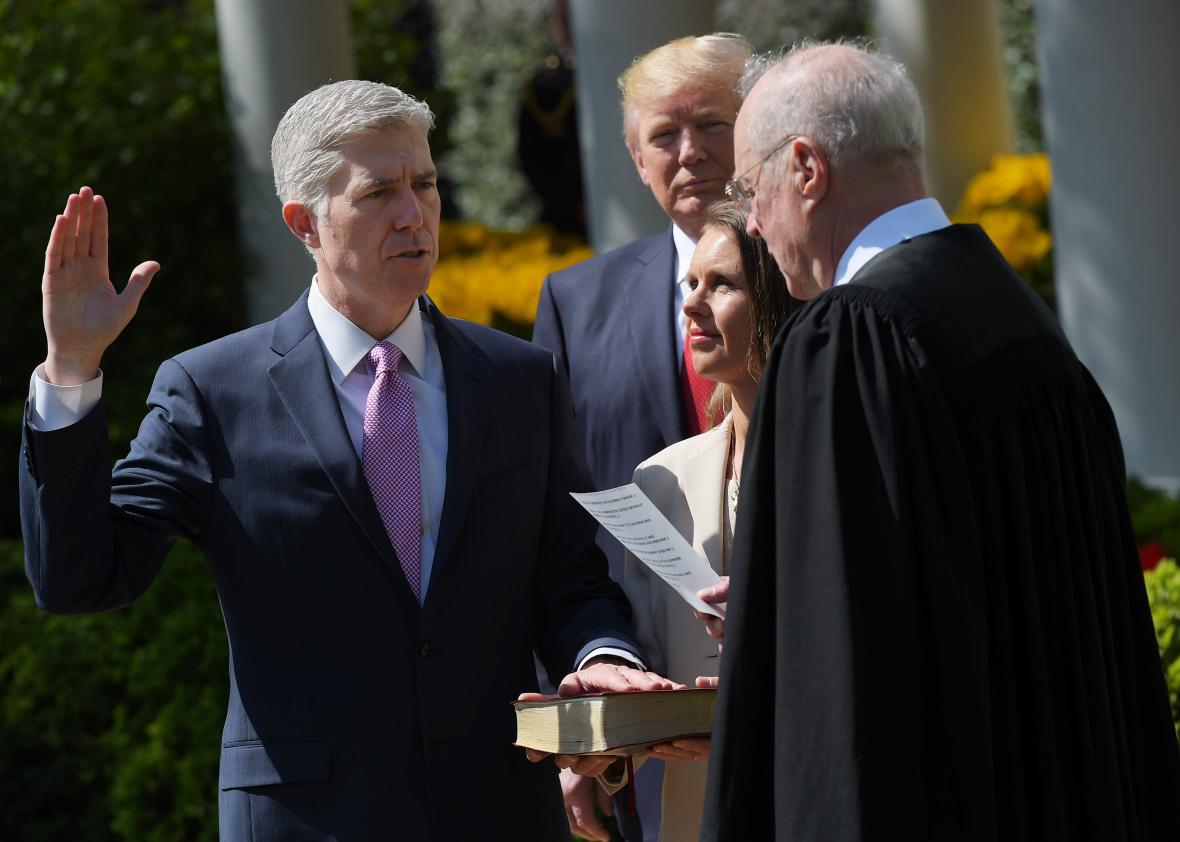A new Supreme Court justice’s first day on the bench is a lot like a talented freshman’s first day on a varsity sports team. It’s a tricky balancing act: Junior justices must be cool and confident while navigating the squally waters of personal and political conflict, concealing any weaknesses that their adversaries could ruthlessly exploit. They must be poised and respectful without coming off as obsequious suck-ups. And they have to do it all in a high-pressure environment where any slip-up could haunt their futures forever.
Neil Gorsuch skippered these waters pretty well on Monday during his first set of oral arguments. The cases were unapologetically boring, but the justice was fervently, ostentatiously engaged. He seemed intent on proving his mettle, interrogating attorneys with a bumptious intensity tempered by the occasional folksy bromide—the goshs and gollys that peppered his nomination hearings have not gone far. His performance on Monday doesn’t tell us much about his philosophy as a justice. But it does demonstrate Gorsuch’s absolute comfort in assuming one of the most powerful jobs in the world.
His evident certainty did not escape the Supreme Court press corps, whose typically staid members deployed an array of euphemistic phrases to capture Gorsuch’s preening. My favorite analysis comes from Robert Barnes of the Washington Post, who wrote that “like a front-row law student,” Gorsuch “flaunted” his knowledge of the cases. “Gorsuch was confident and seemed not the least bit self-conscious as he questioned attorneys,” he continued, calling the new justice “an active, aggressive and somewhat long-winded questioner” who “rarely stopped smiling.”
Barnes’ critique culminated with some terse shade:
Gorsuch at times seemed sensitive about asking so many questions on his first outing.
“I’m sorry for taking up so much time, I apologize,” he said. “My last question.”
But it wasn’t.
Put differently, Gorsuch is a grown-up gunner: That archetypal law student who sits at the front of the classroom, asking and answering every possible question. In the Associated Press, Mark Sherman and Sam Hananel hit this theme: Gorsuch “pip[ed] up early and often,” they wrote, and throughout the day, he “employed a bit of humor, expressed a modicum of humility,” and “showed a hint of irritation.” In the Wall Street Journal, Jess Bravin and Brent Kendall explained that Gorsuch was “quick not only to demonstrate his command of the issues but also to argue that his preferred method of legal interpretation.” His enthusiasm, they conclude, “crashed into the drabness of the day’s cases.”
The junior justice’s sharpest critics weren’t sitting in the press section but on the bench alongside him. At several points, Gorsuch attempted to promote his preference for textualism, asking a government attorney, “Wouldn’t it be a lot easier if we just followed the plain text of the statute?” This question earned an oblique rebuke from Justice Samuel Alito, a part-time textualist himself, who marveled at how “unbelievably complicated” the text was, ultimately asking, “Who wrote this statute? Someone who takes pleasure in pulling wings off of flies?”
“The one thing about this case that seems perfectly clear to me,” Alito continued, “is that nobody who is not a lawyer, and no ordinary lawyer, could read these statutes and figure out what they are supposed to do.” A few minutes later, Justice Elena Kagan also scorned Gorsuch’s approach, musing that “this would be a kind of a revolution, to the extent that you can have a revolution in this kind of case.”
Adam Feldman, the scholar who runs Empirical SCOTUS, told me that during his first argument, Gorsuch was interrupted by his colleagues exactly zero times—despite asking a record 22 questions. Perhaps Gorsuch’s free pass is thanks to his not being a woman: A recent study by Tonja Jacobi and Dylan Schweers found that the female justices are interrupted much more frequently than the male justices and often by their own colleagues. In 2015, for instance, 65.9 percent of interruptions were directed at the three women on the bench. “Overwhelmingly,” Jacobi and Schweers wrote, “it was men doing the interrupting: Women interrupted only 15 percent of the time and men interrupted 85 percent of the time, more than their 78 percent representation on the court.”
Gender dynamics are unlikely to change with Gorsuch’s arrival. What will change is the law. As Tony Mauro notes in the National Law Journal, Gorsuch appeared eager to further hobble class actions in one case, an issue that has long divided the court along partisan lines. (Gorsuch once called class actions a “free ride to fast riches.”) The junior justice also looks ready to resume the work of his predecessor, Justice Antonin Scalia, in rejecting the rights of consumers, women, and LGBTQ people. But we can rest assured that he will do so with a chipper smile.
